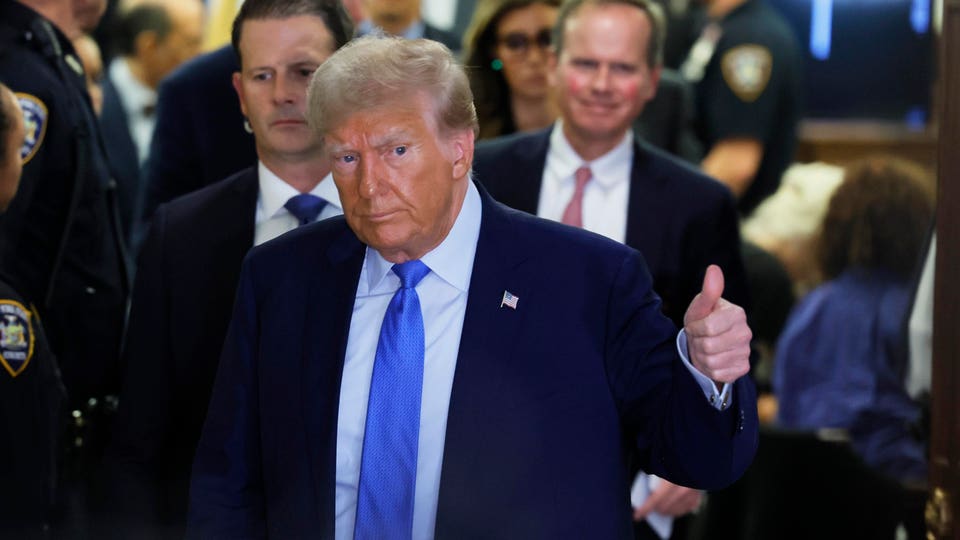Forbes Business Breaking Trump Fraud Trial: Ex-President Keeps Testifying He Didn’t Commit Fraud Because Of This Clause—Here’s Why That’s Wrong Alison Durkee Forbes Staff Following Click to save this article. You’ll be asked to sign into your Forbes account. Nov 6, 2023, 03:02pm EST Press play to listen to this article! Got it! Share to Facebook Share to Twitter Share to Linkedin Topline Former President Donald Trump insisted during testimony Monday in the ongoing civil trial against him that financial documents under scrutiny for alleged fraud weren’t a big deal because they had a clause negating them—but that’s not actually what the clause he points to says, and the judge overseeing the case has already struck his argument down.
Former President Donald Trump leaves the courtroom during his civil fraud trial at New York State . . .
[+] Supreme Court on November 6 in New York City. Getty Images Key Facts New York Attorney General Letitia James sued Trump, his business associates—including his sons—and his business for allegedly fraudulently misstating valuations on statements of financial conditions prepared for financial institutions, which the attorney general alleges were used to obtain more favorable business deals and reflect a higher net worth for Trump. Trump claimed repeatedly Monday—as he did in an April deposition —that a disclaimer in those statements, which he calls a “worthless clause,” absolved him of any responsibility if valuations were wrong, claiming the disclaimer said the numbers could be wrong and banks shouldn’t trust them (making them “worthless”) and instead do their own due diligence.
“That’s why we have a disclaimer clause, if there’s a mistake [so] you don’t have to get sued by the Attorney General of New York,” Trump said Monday, even carrying a copy of the disclaimer in his pocket at the trial, which he pulled out but Judge Arthur Engoron refused to let him read on the stand. In actuality, the statement is far less declarative than Trump claims, saying only that “considerable judgment is necessary” to develop valuations and the numbers in the statements of financial condition “are not necessarily indicative” of what someone could pay for those assets, noting, “The use of different market assumptions and/or estimation methodologies may have a material effect on the estimated current value amounts. ” It also won’t get Trump out of trouble in court, as in a pretrial ruling that found Trump and his co-defendants liable for fraud , Engoron shot down Trump’s reliance on the “worthless clause,” writing Trump’s reliance on the disclaimer is “worthless” in itself and the clause “does not use the words ‘worthless’ or ‘useless’ or ‘ignore’ or ‘disregard’ or any similar words.
” Engoron brought up his ruling during the trial, telling Trump, “If you want to learn about the disclaimer clause, read my opinion—for the first time. ” Crucial Quote “The ‘worthless clause’ does not say what defendants say it says, does not rise to the level of an enforceable disclaimer, and cannot be used to insulate fraud,” Engoron wrote in his pretrial ruling. What To Watch For Trump is scheduled to testify only on Monday in the ongoing trial, before his daughter Ivanka Trump takes the stand Wednesday.
The trial is slated to run through mid-December, and carries potentially heavy consequences for Trump and his family, including a $250 million fine and being barred from running New York businesses. Engoron has already ruled that Trump’s business certificates should be canceled as part of the judge’s pretrial ruling, but an appeals court has put that on hold. Key Background James sued Trump and his co-defendants in November 2022 following a yearslong investigation, alleging the ex-president and his company misstated the value of assets on financial documents more than 200 times between 2011 and 2021.
The lawsuit alleges the defendants misstated numbers on a number of Trump properties, including the valuation of Mar-A-Lago in Florida and the square footage of Trump’s Manhattan penthouse . Trump earned $100 million as a result of the fraudulent valuations, prosecutors alleged in their opening statement, also alleging Trump used fraudulent valuations of his properties to boost his net worth on financial documents by between $1. 9 million and $3.
6 billion per year. While Trump’s attorneys have used the trial to largely shield Trump from the allegedly fraudulent scheme, blaming the financial statements on accountants and lower-level employees, Trump’s former attorney Michael Cohen alleged in his testimony that Trump would direct him and then-CFO Allen Weisselberg to inflate valuations in order to reach Trump’s desired net worth. Trump has denied the allegations and the case against him more broadly, denouncing James’ lawsuit and Engoron’s ruling as part of a partisan “witch hunt” against him.
Further Reading Inside The Courtroom: Donald Trump Testifies In Fraud Case (Forbes) Trump Testifies: Fraud Trial Testy As Judge Tells Ex-President’s Attorney To ‘Control Your Client’ (Forbes) Trump Will Testify In Fraud Trial Today—Here’s What He Could Say (Forbes) What Role Did Trump Play In Alleged Fraud Scheme? Here’s What Trial Has Revealed So Far. (Forbes) Bad Accounting Or Fraud? Trump’s Profit Numbers Don’t Add Up (Forbes) How Trump, Master Of Avoiding Paper Trails, Finally Got Caught With One (Forbes) Follow me on Twitter . Send me a secure tip .
Alison Durkee Editorial Standards Print Reprints & Permissions.
From: forbes
URL: https://www.forbes.com/sites/alisondurkee/2023/11/06/trump-fraud-trial-ex-president-keeps-testifying-he-didnt-commit-fraud-because-of-this-clause-heres-why-thats-wrong/
